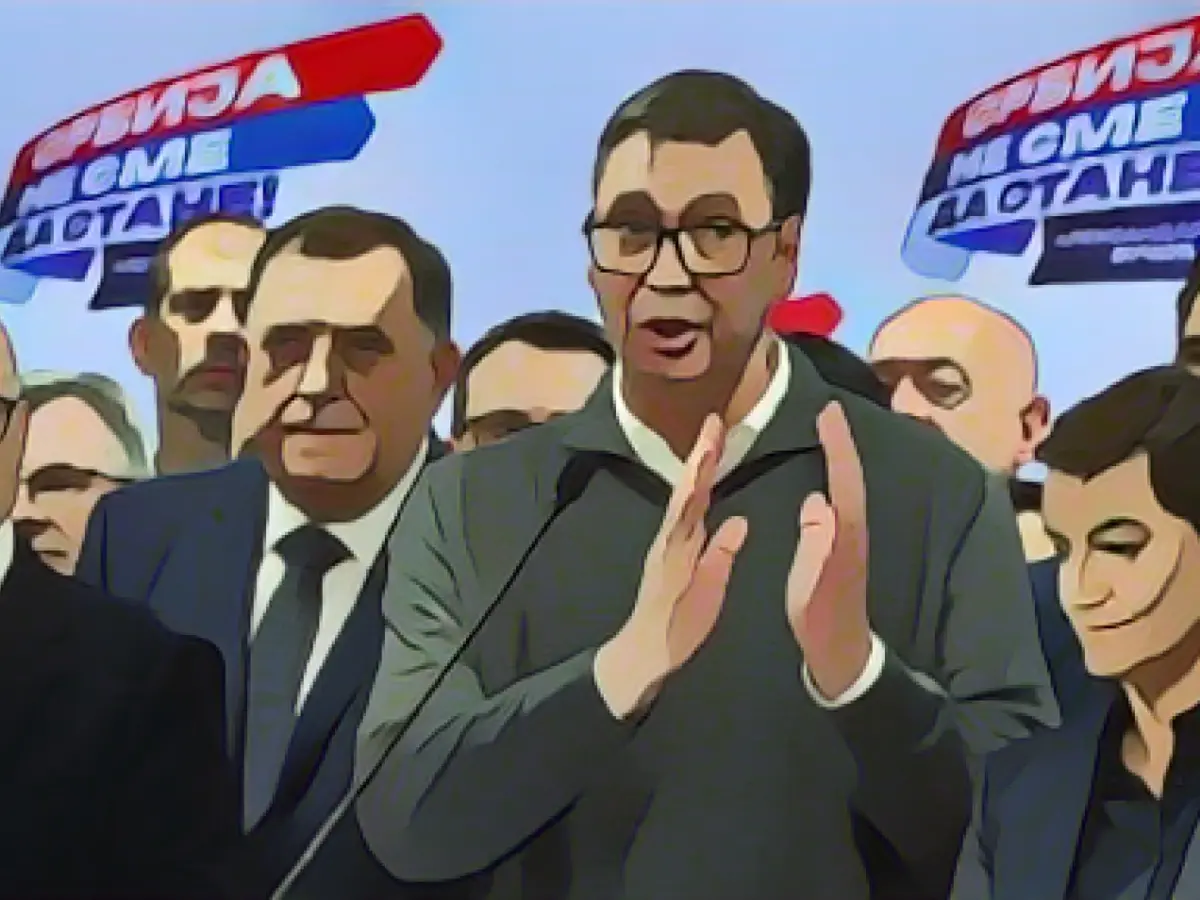Serbia's president claims victory for his party in parliamentary elections
"It was my job to do everything in my power to secure an absolute majority in parliament," said Vucic. He was "very proud" of the election campaign. If the result is confirmed, Vucic 's ruling SNS would emerge stronger from the election. Previously, it had 120 of the 250 seats and was dependent on a coalition partner.
Vucic's SNS was the favorite going into the election despite high inflation and months of mass protests in Serbia. The president was omnipresent in the election campaign and Sunday's vote was seen as a referendum on his government.
The elections in the Balkan state were overshadowed by allegations of electoral fraud. Opposition leader Radomir Lazovic complained of "a lot of irregularities" during the election. He spoke of "vote buying" and forged signatures and possibly the "dirtiest election process".
The opposition declared that entire buses of voters from outside Belgrade had been brought to the capital to cast their votes. Prime Minister Ana Brnabic rejected the accusations on the online service X, formerly Twitter.
Election observers from the Center for Research, Transparency and Accountability said they had been attacked in the town of Odzaci in the north-east "after a case of electoral fraud was registered". Dozens of ballot papers were taken from party offices to the opposite polling station.
The biggest competition for Vucic's party was the loose opposition alliance Serbia Against Violence. The movement emerged from the mass protests following two gun attacks in the spring that left a total of 18 people dead. The demonstrators accused the government of promoting a culture of violence, including with the help of the media it controls. The protests were increasingly directed against government policy as a whole.
In addition to the parliamentary elections, local elections were also held in around 60 cities on Sunday. In the capital Belgrade, the opposition was given a chance.
Vucic had called the new parliamentary elections himself. Since he first took office in 2014 - when he was still Prime Minister - government cabinets in Serbia have rarely lasted until the end of a legislative period. Critics see this as a maneuver to obstruct the opposition.
Read also:
- This will change in December
- Attacks on ships in the Red Sea: shipping companies avoid important trade route
- German activists speak out in Dubai on suffering in Israel and the Gaza Strip
- Despite UN vote: fighting between Israel and Hamas in the Gaza Strip continues
Vucic's victory in the parliamentary election would mean a stronger position for his Serbian Progress Party (serbian progress party) in Serbia's Parliament, as they looked set to increase their seat count from 120 to potentially an absolute majority. The ruling SNS had faced criticism for their handling of high inflation and months of mass protests in Belgrade, but Vucic's omnipresence during the election campaign had likely played a significant role in securing his party's position.
However, allegations of electoral fraud and irregularities had overshadowed the election process. Opposition leader Radomir Lazovic and Prime Minister Ana Brnabic engaged in a heated debate over vote buying and forged signatures amid claims of busloads of outside voters being brought to the capital.
In the heart of the ongoing controversy, the opposition alliance Serbia Against Violence emerged as Vucic's main competition. The movement, born out of the aftermath of two spring gun attacks, sought to challenge the government's promotion of a culture of violence, including through the media they controlled. The mass protests were aimed at government policy, with the demonstrators increasingly directing their criticism towards the ruling SNS.
On Sunday, local elections were also held in approximately 60 cities across Serbia, with the opposition given a rare opportunity in the capital, Belgrade. The Serbian Progress Party (serbian progress party) would likely maintain their dominant position in the capital as well, having campaigned under Aleksandar Vucic's leadership.
Election observers from the Center for Research, Transparency, and Accountability reported facing threats and violence, including having ballot papers stolen and taken to rival polling stations, in places like Odzaci. Despite these challenges, the elections were viewed as a significant test of public sentiment towards the ruling party and government policies.
In the lead-up to the election, President Vucic had triggered calls for new parliamentary elections, citing the need for a fresh mandate. His supporters claimed that this was an opportunity for Serbian progress, while critics saw the move as an attempt to impede the opposition's progress and extend the ruling party's hold on power.
Ultimately, the outcome of the election would have significant consequences for the future of political dynamics in Serbia, as the Serbian Progress Party (serbian progress party) looked poised to build on their achievements and potentially shape Serbia's political landscape for years to come.
Source: www.stern.de







